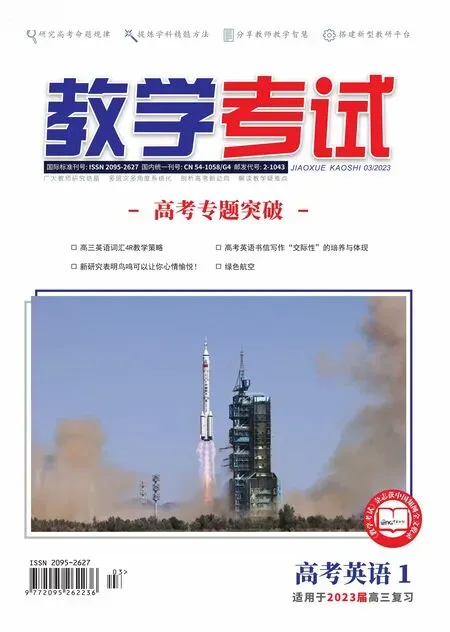逆向旅游
张诗迎
(湖北省荆州市松滋一中)
Reverse Tourism
Going against the tide of flocking to well-known yet generally jam-packed tourist destinations on vacation,a growing number of holidaymakers in China tend to spend their leisure time at lesser-known resorts to seek unique,relaxed holiday experiences.“Reverse tourism”has emerged as a new trend among young holidaymakers in China.
During the week-long public holiday,which ended on Oct.7,large numbers of vacationers,especially young professionals who long to escape hectic city life,shunned popular holiday destinations in order to get off the beaten track and enjoy some peace and quiet.
According to data from online travel agency Qunar,as cited byBeijing Daily,the number of rooms booked at hotels in less-traveled cities during the holiday was up 30 percent year-on-year.Bookings for four-and five-star hotels in less-traveled places including Linxia in Gansu province,Shizuishan in the Ningxia Hui autonomous region,and Haibei in Qinghai province all increased at least 10-fold compared with the same period of 2021.
Besides crowds,some vacationers chose less-traveled places to save on the cost of trips to popular destinations,which often entail pricey tickets,meals and hotel stays.
“Tourism used to be about sightseeing.Now it is about experiences,”Dai Bin,president of the China Tourism Academy,toldBeijing Daily.Lesser-known attractions are not as“commercial”and“standardized”as developed ones and are able to offer more authentic experiences and natural encounters,according to social media posts.And unlike popular destinations,some underexplored places with little online exposure can offer more surprises.
COVID-19 is another key factor fueling reverse tourism.As precautionary measures continue,traveling has an unpredictable quality.A traveler has no way of knowing what lies ahead before departure,be it a perfect holiday or one interrupted by a sudden outbreak.Travelers have thus become more cautious and tend to choose local attractions or places with fewer tourists.
“The rise of reverse tourism is hardly a bad thing,”said an opinion piece inZhengzhou Daily.It means that vacationers now have more options,which brings more possibilities to the tourism market,the article explains.More importantly,it noted,the trend is set to force popular destinations to improve themselves instead of resting on their laurels.
Jiang Han,a senior researcher at the Beijing-based public policy think tank Pangoal,said that reverse tourism will become one of the future directions for the market and is an opportunity for growth comparable to the camping economy.To give a real boost to the tourism market,Jiang suggested that more efforts be made to tap the potential of underrated,lesser-known destinations.
阅读小练
1.What does the underlined word“jam-packed”in Paragraph 1 mean?
A.Deserted. B.Broad.
C.Crowded. D.Attractive.
2.Why do some vacationers choose less-traveled places?
A.Because they are not fond of socializing.
B.Because they don’t want to spend their money on tickets.
C.Because traveling to sparsely populated areas is the only choice during the pandemic.
D.Because it can offer them more real experiences.
3.What is the impact of reverse tourism on the tourism market?
A.It dominated the tourism market.
B.It leads to a decline in the tourism market.
C.It makes well-known attractions no longer popular.
D.It creates more chances for the tourism market.
4.What is the main idea of the passage?
A.More people get off the beaten track for relaxing break.
B.A large number of holidaymakers in China oppose reverse tourism.
C.Some ways to make less-known destinations popular.
D.Reverse tourism has great prospects recently.
(答案见P45)
全篇译文
在中国,越来越多的度假者倾向于把他们的闲暇时间花在鲜为人知的度假胜地,以寻求独特、轻松的度假体验,这与人们在度假时蜂拥前往知名但普遍拥挤的旅游目的地的潮流相反。“逆向旅游”已成为中国年轻度假者中流行的一种新趋势。
在十一假期间,大量度假者,尤其是渴望逃离繁忙的城市生活的年轻职场人士,为了不走寻常路,享受一些闲适与宁静,避开了热门度假目的地。
《北京日报》报道称,据在线旅游机构“去哪儿网”的数据,十一假期间,在游客较少的城市,酒店预订的房间数量同比增长了30%。在游客较少的地区,包括甘肃临夏、宁夏回族自治区石嘴山和青海海北,四星级和五星级酒店十一假期间的预订量都比2021 年同期增长了至少10 倍。
除了拥挤的人群之外,一些度假者选择人迹罕至的地方以节省前往机票、餐饮和酒店住宿往往都很贵的热门目的地费用。
中国旅游研究院院长戴斌告诉《北京日报》:“旅游业过去是观光,现在是体验。”据社交媒体帖子称,不太知名的景点不像成熟景点那样“商业化”和“标准化”,能够提供更真实的经历和自然体验。与热门目的地不同的是,一些未被开发的、很少在网上曝光的地方可以带来更多惊喜。
新冠肺炎疫情是推动逆向旅游的另一个关键因素。随着预防措施的继续,旅行具有不可预测性。旅行者在出发前对于将会发生什么——到底是完美的假期,还是会被突发疫情打断——不得而知。因此,旅行者变得更加谨慎,倾向于选择当地景点或游客较少的地方。
《郑州日报》的一篇评论文章写道:“逆向旅游的兴起并不是一件坏事”。文章解释说,这意味着度假者现在有了更多的选择,这给旅游市场带来了更多的可能性。它(文章)指出,更重要的是,这一趋势将迫使热门旅游目的地改善自身,而不是依赖其过去的光环。
位于北京公共政策研究机构盘古智库的高级研究员江瀚说,逆向旅游将成为未来旅游市场的趋势之一,其发展机会可以与露营经济相媲美。江瀚建议,为了真正促进旅游市场的发展,要更加努力地挖掘那些被低估、不太为人所知的旅游目的地的潜力。
答案和解析
新研究表明鸟鸣可以让你心情愉悦
1.C 词义猜测题,根据第一段第二句“This could be good news for your mental health because birdsong can help relieve anxiety.”可知,soothed 应为relieve 的近义词,结合选项可知,应为reduced。故选C。
2.B 细节理解题,根据第六段内容可知,即使不是真的鸟鸣声,电脑播放的鸟鸣声也有助于缓解压力。根据第十段最后一句可知,A 选项错误;根据第三段倒数第二句可知,参与测试的295 名参与者都是健康的人,C 选项错误;根据第五段最后一句可知,D 选项错误。故选B。
3.D 标题概括题,根据最后一段最后两句“It is clear that birdlife has been adversely affected by urbanization,in terms of habitat loss and other negative impacts such as disorienting noise pollution.The Swaddleobserves that humans should read this as a warning to protect biodiversity so that city dwellers don’t end up only accessing birdsong via digital media.”可知,城市化给鸟类带来了栖息地的破坏和其他像噪音污染等问题。人类应将其这看作是一个提醒我们需要保护生物多样性的警示。综上可知,作者呼吁大家在城市化的进程中要关注保护鸟类。由此可推知,D 项“因城市化而呼吁保护鸟类”适合放在空格处,作为一个小标题。故选D。
逆向旅游
1.C 词义猜测题。由第一段第一句可知,越来越多的度假者倾向于把闲暇时间花在不太知名的度假胜地,开头句中有“against”,表明与后文提到的知名度假胜地相反。从后文也可知人们目前不喜欢人多的景点,deserted 意为“空无一人的”;broad 意为“宽广的,宽阔的”;crowded 意为“拥挤的”;attractive 意为“吸引人的”。故选C。
2.D 细节理解题。由第五段第三句“Lesser-known attractions are not as‘commercial’and‘standardized’as developed ones and are able to offer more authentic experiences and natural encounters,according to social media posts.”可知,据社交媒体帖子称,不太知名的景点不像成熟景点那样“商业化”和“标准化”,能够提供更真实的经历和自然体验。故选D。
3.D 细节理解题。由倒数第二段第二句中的“It means that vacationers now have more options,which brings more possibilities to the tourism market”可知,这意味着度假者现在有了更多的选择,给旅游市场带来了更多的可能性。故选D。
4.A 主旨大意题。本文为一篇新闻报道。在中国,越来越多的度假者倾向于把闲暇时间花在鲜为人知的度假胜地,以寻求独特、轻松的度假体验,这与人们在度假时蜂拥前往知名但普遍拥挤的旅游目的地的潮流相反。“逆向旅游”已成为中国年轻度假者中流行的一种新趋势。文章为总分结构。开头交代了文章大意,中间分析造成这一现象的原因,最后为专业人员对这一现象的评价。故选A。

